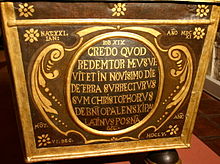Krzysztof Opaliński
Krzysztof Opaliński (born January 21, 1611 in Sieraków , † December 6, 1655 in Włoszakowice , Poland ) was a Polish nobleman , civil servant, politician and poet. As the son of Piotr Opaliński (1586–1624), he came from the noble family of Opalińskis . His mother was Zofia Opalińska, née Kostka .
Life
Opaliński studied together with his brother Łukasz (1612–1666) from 1620 to 1625 at the Lubrański Academy in Poznan and later from 1626 to 1630 in Leuven , Orléans and Padua . After returning to Poland as the Starost of Śrem , he became active in the political landscape of the state. In 1632 he took part in the election of King Władysław IV. Wasa and was elected as a member of the Sejm . In 1637, after the death of his uncle Jan Opaliński (1581–1637), he became voivode of Poznan. He was in opposition to most of the military plans of Władysław IV. Wasas (including the expansion of his army for the " crusade " against the Ottoman Empire ), but supported his idea for the establishment of tariffs for sea trade. In 1645 he headed an embassy to Paris to mediate the marriage of Luisa Maria Gonzaga with Władysław and to accompany her to Poland.
In 1647 he bought Sieraków from his brother Łukasz and moved there. In 1650 he opened the first modern school in Poland , making use of the didactic material of Johann Amos Comenius . As a Catholic , he supported religious tolerance and was an opponent of the Jesuits . He appeared as a patron of numerous writers and scientists and was known as a bibliophile. Among his political rivals in Wielkopolska was the Starost Bogusław Leszczyński (1612-1659), with whom he competed for the post of voivod of Poznan.
When John II Casimir was elected the new king of Poland in 1648, Krzysztof Opaliński joined the opposition to this. The king had few supporters and friends in the ranks of the Polish Szlachta, as he openly sympathized with Austria and was ignorant and contemptuous of Polish culture. Therefore, many nobles of the state of John II thought Casimir either a weak king or a king who supported the Jesuits ("Jesuit king") or had other reasons for rejecting him and instead supporting the Protestant Karl X. Gustav of Sweden immediately, claims to the Polish Asserting the throne. During the following Swedish invasion decided that the defense Wielkopolska entrusted Krzysztof Opaliński and Bogusław Leszczyński to be together because of their dissatisfaction with Johann II. Kasimir, Karl Gustav with her needle array (pospolite ruszenie) on 25 July 1655 at Ujście without a fight surrender. Many other voivods followed their example, particularly Janusz Radziwiłł in the Grand Duchy of Lithuania , although Krzysztof's brother Łukasz Opaliński remained loyal to the Polish king. Large parts of the country were then taken by the Swedes - until the siege of Jasna Góra and the Confederation of Tyszowce , which brought the war against the Swedes to a turning point.
Krzysztof Opaliński was buried next to his father in the catacombs of the Sieraków Church.
Civil service
Opaliński was the Starost of Śrem, Kowel and Międzylesie from around 1630 . From 1637 he followed in the office of a voivod of Posen.
Marriage and offspring
Opaliński was married to Teresa Konstancja Czarnkowska († 1660) from 1634. The marriage had six children, including two sons:
- Piotr Adam Opaliński (1636–1682)
- Jan Karol Opaliński (1642–1695), grandfather of Maria Leszczyńska through one of his daughters
Works
Opaliński was the author of a popular work that was reprinted many times in the 17th century and was called Satyry, albo Przestrogi do naprawy rządu i obyczajów w Polszcze należące ( Satires , or Warnings for Reforming Government and Customs in Poland). He published it in 1650, at the time of the Khmelnytskyi Uprising , which ended the Golden Age of Poland-Lithuania. These satires, written after the model of the satires of Juvenal , are probably his most famous work. In them he denounced the oppression of the peasants (which promoted serfdom ) and the abuse of the golden freedom , which was expressed in the increasing anarchy of political life in Poland-Lithuania. He also wrote on the subject of witchcraft in one of his satires, making him one of the few contemporary figures who clearly recognized and rejected some of the motives behind the witch hunt. He also wrote comedies and tragedies for his school, but these have not been recorded. His letters to his brother Łukasz provide information about his life and were collected in Listy Kszysztofa Opalińskiego do brata Łukasza 1641-1653 (first edition 1957).
literature
- Michael J. Mikoś: Polish Baroque and Enlightenment Literature: An Anthology . Ed. Michael J. Mikoś, Columbus OH / Slavica Publishers, Bloomington IN, 1996, ISBN 0-89357-266-7 , pp. 104-108 (contains a short biography and: Satire III: On Burdens and Oppressions of Peasants in Poland .)
- Kate Wilson: The Politics of Toleration Among the Szlachta of Great Poland: Rafał Leszczyński (1579–1636) and Krzysztof Opaliński (1609–55) . Slovo 14/2002
Web links
| personal data | |
|---|---|
| SURNAME | Opaliński, Krzysztof |
| BRIEF DESCRIPTION | Polish-Lithuanian nobleman, politician, writer |
| DATE OF BIRTH | January 21, 1611 |
| PLACE OF BIRTH | Sieraków |
| DATE OF DEATH | December 6, 1655 |
| Place of death | Włoszakowice |



